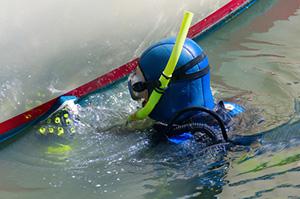NOT ALL LAW FIRMS ARE IN THE SAME BOAT
Commercial Scuba Diving Accidents & Deaths

According to published data, approximately 80 divers lose their lives in the United States and Canada every year due to scuba diving accidents. This represents a rate of approximately 3.4 to 4.2 deaths per 100,000 divers according to the scuba diver organization DAN America. While the causes of these commercial scuba diving deaths vary, most occur due to multiple root causes, including gas-supply problems (41%), entrapment/entanglement (19%), and equipment troubles (16%). Countless more divers sustain serious injuries that can lead to permanent disabilities. Other common causes of scuba diving accidents include: emergency ascent, insufficient breathing gas, and buoyancy problems. In the Puget Sound area, commercial diving includes harvesting of commercial seafood, diving to support construction operations on piers and docks, diving to support repair of vessels, and other commercial underwater activities. Many of these accidents could be prevented by employers followed the safety regulations set forth in Chapter 296-37 of the Washington Administrative Code. The WAC provides specific rules to limit the risk of injuries and deaths to commercial divers. Planning for a diving operation must include a safety and health assessment of the diver under WAC 296-37-535(4). Diving operations must be coordinated with other activities in the area that might interfere with diver safety under WAC 296-37-535(5).
Coverage for Commercial Divers Under the Jones Act
Many commercial divers have coverage for injuries or deaths under the federal Jones Act and general maritime law. Under the Jones Act, a diver can be considered a seaman entitled to Jones Act coverage for injuries and deaths if the commercial diver: (1) works on a vessel “in navigation”; (2) has an employment connection to the vessel that is substantial both in terms of duration and its nature; and (3) the diver’s work contributes to the work of the vessel. See, e.g., Chandris, Inc. v. Latsis, 515 U.S. 347, 1995 AMC 1840 (1995). The question of whether a commercial diver is considered a “seaman” under the Jones Act can be complex and requires a detailed fact-analysis by an experienced commercial diving maritime lawyer looking at the specific nature of the diver’s work and its relationship to the vessel. If you have questions about whether you or your loved one is entitled to coverage under the Jones Act, our lawyers offer a free consultation to help you determine your rights under the Jones Act.
Benefits Under the Jones Act
Following an injury or death to a commercial diver who is covered under the Jones Act, the commercial diver is entitled to a number of benefits. For injuries, the injured diver is entitled to maintenance, cure, and unearned wages. Maintenance is a daily stipend to cover the injured commercial diver’s room-and-board expenses while they recover from an injury. Medical cure is the medial expenses related to an injury. Unearned wages are wages that the injured commercial diver would have earned through the end of the voyage or pay-period. Further, if the diver’s injury was caused by the negligence of the diver’s employer, negligence of a co-worker, unsafe condition, or malfunctioning equipment, the diver can recover damages for lost wages, lost earning capacity, retraining costs, pain, disability, suffering, and loss of enjoyment of life. If you have questions about your rights to damages following a commercial diving accident, contact our law firm for a free consultation with an experienced maritime injury attorney.
In the context of a commercial diving death, the Jones Act allow for recovery of pre-death pain and suffering and pecuniary losses, including the loss of care and nurture to surviving children, financial support and contributions that the deceased would have made to survivors, loss of services, loss of inheritance, and funeral expenses. A Jones Act wrongful death claim must be brought by a personal representative for the benefit of (1) the surviving spouse or children; (2) parents; and (3) dependent next of kin. If you have questions regarding your right to damages for the wrongful death of a commercial diving, contact our law firm for a free consultation with one of our commercial diving accident maritime attorneys.







